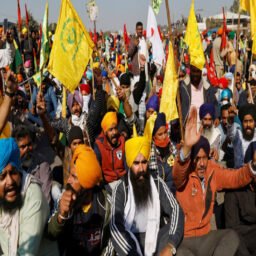INTRODUCTION
One should always work to ensure that one’s fundamental requirements are satisfied or else, One’s life will be unsatisfactory. To put it another way, work to maintain a decent quality of living. Following World War II, the right to work became a core issue of debate, and the International Covenant on Economic, Social, and Cultural Rights contains the right to work in its provisions. In the human rights discussion, the right to work often come to the forefront. Despite this, the overwhelming amount of the world’s population lives in poverty.
The right to work is not explicitly acknowledged as a fundamental right within Indian Constitution. It is enshrined in Article 41[1] of the Constitution of India, making it unenforceable in court. Although “Right to Work” is not clearly stated in the Fundamental Rights by the Constitution of India, But it has been established as a Fundamental Right through Judicial interpretations.
PERSPECTIVES ON RIGHT TO WORK
The Government of India is the backbone of individual rights and liberties, as well as the foundational element under which all Indian laws, including labour and employment regulations, must perform. “The spread of the ‘right to work’ notion reflects in part a pattern of globalisation which goes beyond the economic to the ideological and ethical domains.”[2] Through Article 23[3] of the UDHR, the right to work was elevated from a plain state right to such an individual human right. Later, by Article 6(1)[4] of the ICESCR, which requires any State Party to recognise everyone’s right to work, this right was turned into an obligatory standard.
The Articles, which are enshrined within the Directive Principles of State Policy, are incapable of ensuring the right’s enforceability. Article 41[5] of the Constitution provides that “the State shall within the limits of its economic capacity and development, make effective provision for securing the right to work, to education and public assistance in cases of unemployment, old age, sickness and disablement, and in other cases of undeserved want.”
Mainly owing to the Supreme Court’s decision, which gave a broader reading of Article 21in Olga Tellis & Ors. v. Bombay Municipal Corporation & Ors[6] “right to work was recognized as a fundamental right inherent in the right to life.”
MGNREGA[7]: Step towards Right to work
The concern with India’s growth is that some areas of the country including society reap all of the advantages of development while the rest of the country and society are relatively unaffected. The country’s poverty alleviation rates have risen, but not to the extent that they should’ve been after several years of independence and with so many policies and programs in place. In India, one of the driving principles of the development process has been poverty alleviation.
The NREGA was passed in September 2005 & went into effect on February 2nd, 2006, as that of the National Rural Employment Guarantee Scheme (NREGS). Starting October 2009, it has been known as the Mahatma Gandhi National Rural Employment Guarantee Act (MGNREGA). “MGNREGA is the first-ever law internationally that guarantees wage employment at such an unprecedented scale.”[8] “The constitutional right to livelihood does not always expand into a right to demand work in India, Except where a statutory right is provided, as under the MNREGA, 2005.”[9] The Act provides a one-of-a-kind provision that ensures guaranteed work and salary payment within 15 days. The top three states in terms of MGNREGA implementation included Rajasthan, Andhra Pradesh, and Tamil Nadu.
MGNREGA, one of the world’s largest skill public employment schemes, was turned into such an Act in 2005 after Legislation was introduced in Parliament. The Act established the right to work as a lawful right, assuring the rural population’s fundamental financial stability. With the instance of the COVID-19-induced national lockdown, the importance of MGNREGA as a lifesaver for the poor and working-class in rural Areas has been proven once again.
RIGHT TO WORK AND COVID-19
The vast majority of employees’ lives and jobs have suffered significant damage in the process of the unexpected declaration of lockdown throughout the state due to Covid-19, and a tremendous uncertainty remains to hover over their near foreseeable future. The present Covid-19 situation in the country, the economy, particularly daily wagers and jobs, is the most affected sector of the country. Every factory has come to a stop, and the workers who always used to feed their families with their hard-earned money are all now dying of starvation on the streets. Many of these serious repercussions for the country poorest are due to a lack of adequate protections in labour legislation and other legislation relating to the right to work.
The COVID-19 outbreak, as well as the subsequent economic shockwaves, is laying a tremendous burden on the realm of work, as well as the employees and employers whose livelihoods are relied on it. On multiple levels, the emerging COVID-19 outbreak introduces great challenges to core workplace values and rights. The catastrophe has resulted in a substantial increase in socioeconomic fragility, boosting the opportunity cost of training and fuelling fears that more families may succumb to child labour to make up for the shortfall. As a consequence of the outbreak, millions of people have lost their jobs and have no funds or social security to rely solely on upon, tend to be more susceptible to debt slavery and other types of bonded labour.
The crisis is also resulting in a deterioration of working conditions that are already exploitative, moving workers further along the continuum of abuse that ends in forced labour and trafficking. There are growing accounts of additional difficulties facing workers – and especially migrant workers – who are already in situations of vulnerability. The most significant fallout of this measure was the disappearance of millions of jobs, and the particularly heart-wrenching aspect of it was the distress of migrant workers. The lockdown impacted the daily wage workers and other private job holders to lose their jobs and made them struggle for survival. The restriction of lockdown made it impossible for them to even work for food.
CONCLUSION
The right to work alludes to people’s essential right to work in stable jobs if they are unable to do so otherwise. The preamble of the constitution assures civil, economic, and political liberty to all Indians. The same remedy is reflected in DPSP, which, among some other things, allows the state to reduce economic inequality and eliminate disparities in social position, amenities, and resources, as well as to guide its policy forward into ensuring that “the ownership and management of both the society’s financial resources are still so assigned as to better represent the greater good.” Just with the proper policies and procedures will we be capable of building the future we desire through the provision of adequate work opportunities. Existing normative standards should be used to support these policies.
The vision of a country with 100 per cent work is not unrealistic; it is enshrined in the country’s fundamental document, the Constitution. The government needs to make every person qualified to survive in circumstances like this, or they will pay a hefty price for their indifference. The multiple laws safeguarding the right to work must be regularly updated to reflect current events and operate effectively.
Author(s) Name: Mythri Medam (Damodaram sanjivayya national law university, Visakhapatnam)
References:
[1] Constitution of India, art. 41.
[2] Wendy Olsen, ‘The Right to Work and Differentiation Indian Employment’, [2006] Indian Journal Of Labour Economics.
[3] Universal Declaration of Human Rights, art. 23.
[4] International Covenant on Economic, Social, and Cultural Rights, art. 6(1).
[5] Constitution of India, art. 41.
[6] Olga Tellis & Ors. v. Bombay Municipal Corporation & Ors., AIR 1986 SC 18.
[7] The Mahatma Gandhi National Rural Employment Guarantee Act, 2005
[8] Nayak & et.al, The Right to Work, State and Society: Study of MGNREGA, [2005] International Journal Of Social Sciences
[9] Sankaran. K, ‘The human right to livelihood: Recognizing the right to be human’ [2012] Comparative Labor Law & Policy Journal, 81
















